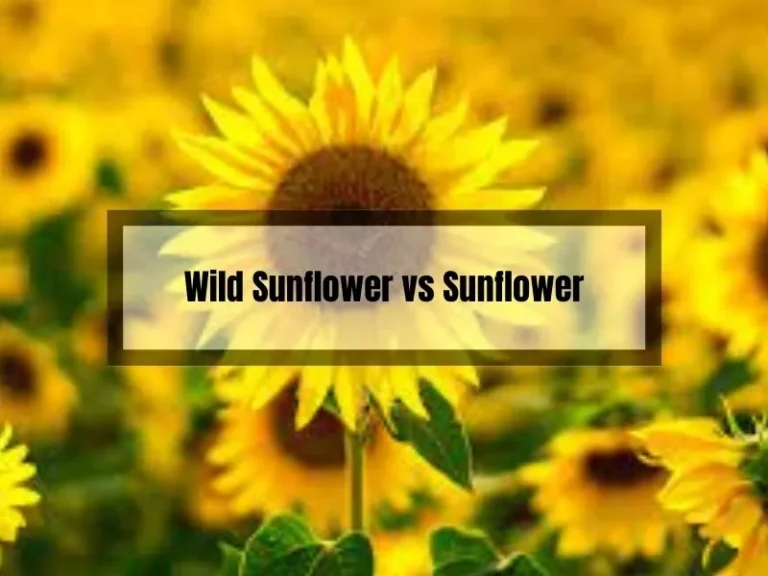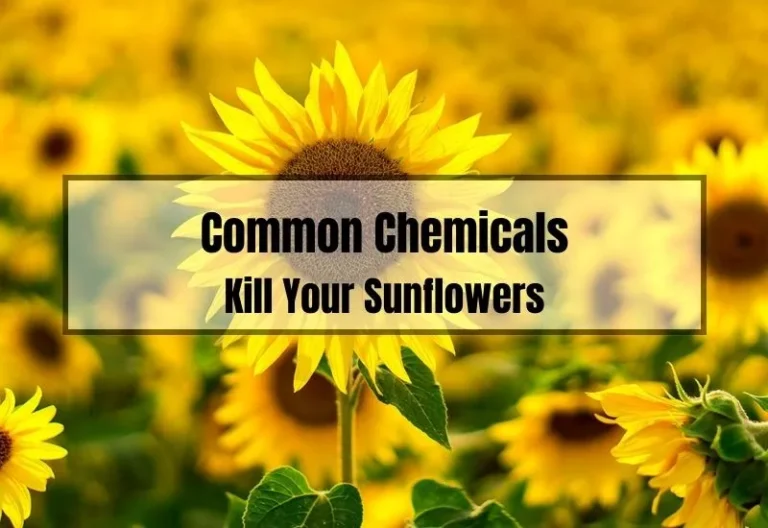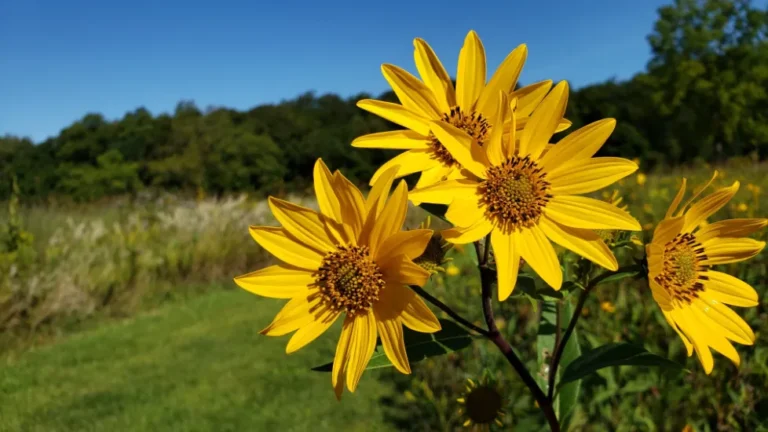Will Glyphosate Herbicide Harm Sunflowers?
Are you a sunflower enthusiast wondering if glyphosate herbicide can harm your beloved flowers? Glyphosate is a commonly used herbicide that can effectively control many types of weeds, but what about sunflowers? Will glyphosate harm or kill these beautiful flowers? The answer is not straightforward.
Glyphosate is a broad-spectrum herbicide that works by blocking the production of an enzyme essential for plant growth. Glyphosate can kill many types of plants, including sunflowers, if not used correctly.
However, the effects of glyphosate on sunflowers depend on various factors, such as the sunflower’s growth stage, the amount of glyphosate used, and the method of application.
So, what are the effects of glyphosate on sunflowers, and are there any alternatives to glyphosate for sunflower cultivation? In this article, we will explore the answers to these questions and provide you with the precautions you need to take when using glyphosate to ensure your sunflowers remain healthy and beautiful.
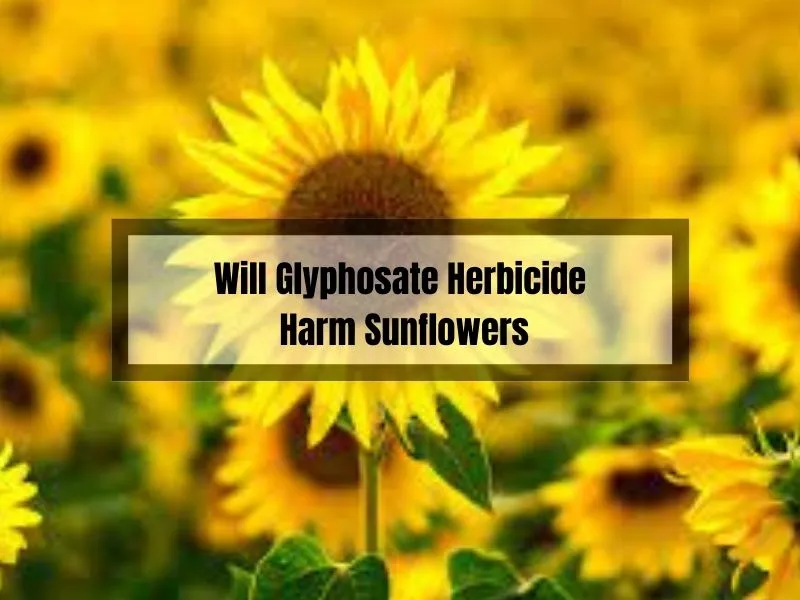
Will Glyphosate Kill Sunflowers?
If you are planning on using glyphosate to control weeds in your sunflower field, you may be wondering if it will also harm your sunflowers.
Glyphosate is a non-selective herbicide, which means it can kill any plant it comes into contact with. However, the effects of glyphosate on sunflowers can vary depending on the timing and method of application.
Timing of Application
Glyphosate is most effective when applied to young, actively growing weeds. If you apply glyphosate after your sunflowers have emerged, they may not be as susceptible to the herbicide.
In fact, research has shown that sunflowers can tolerate glyphosate applications up to the V4 growth stage, which is when the fourth leaf appears. After this stage, sunflowers become less sensitive to glyphosate.
Method of Application
The method of glyphosate application can also affect its impact on sunflowers. If you apply glyphosate directly to the sunflowers, it will likely cause damage or even death.
However, if you use a directed application method, such as using a shielded sprayer or wick applicator, you can minimize the amount of glyphosate that comes into contact with the sunflowers.
I have personally used glyphosate to control weeds in my sunflower field, and I found that timing and method of application were crucial in minimizing damage to my sunflowers. I applied glyphosate when the sunflowers were still in the seedling stage, and I used a wick applicator to apply the herbicide directly to the weeds. By doing so, I was able to effectively control the weeds without harming my sunflowers.
Effects of Glyphosate on Sunflowers
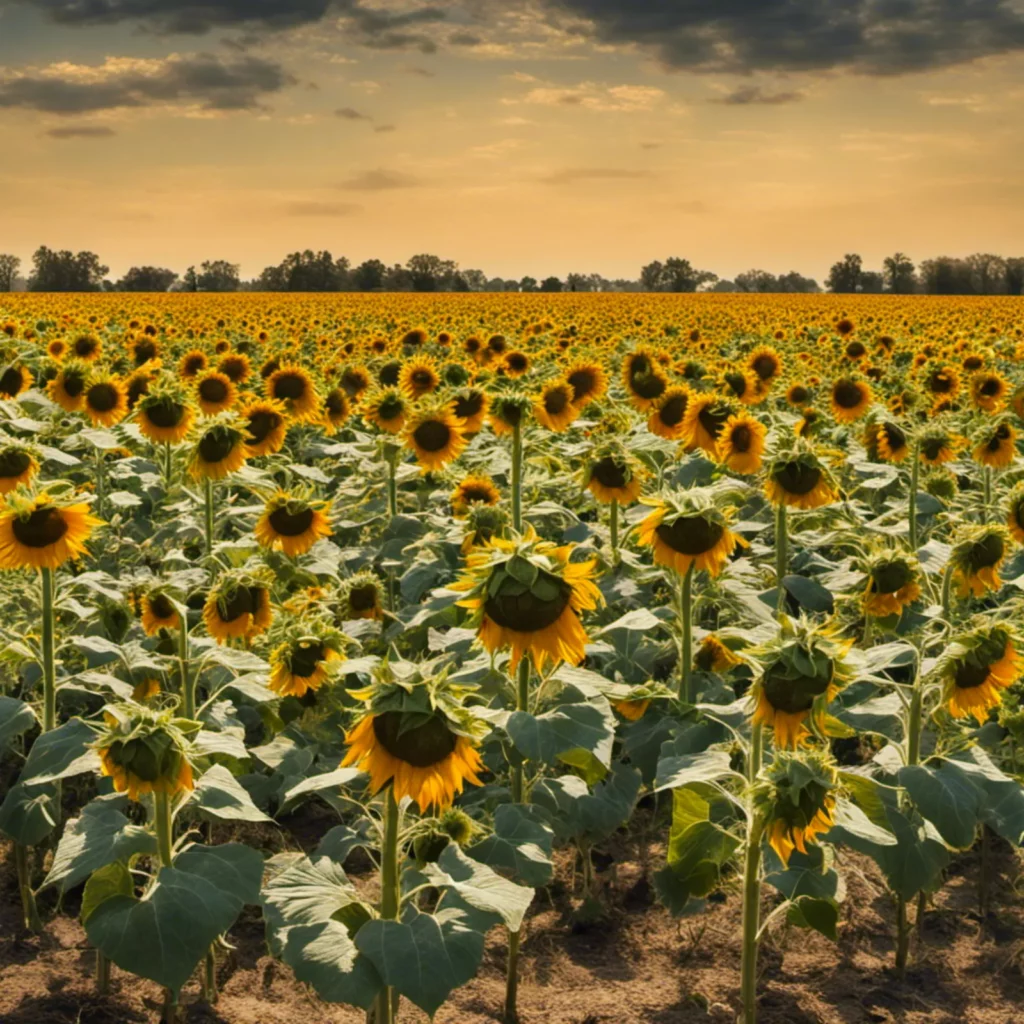
Sunflowers are a beautiful addition to any garden or landscape. These plants are known for their large, bright yellow flowers and their ability to attract birds and other wildlife. However, if you are growing sunflowers, you may be wondering if glyphosate will kill them. Glyphosate is a popular herbicide used to control weeds, but it can also have unintended effects on non-target plants like sunflowers.
Glyphosate works by inhibiting the production of certain proteins that are essential for plant growth. This means that when glyphosate is applied to a plant, it can cause the plant to stop growing and eventually die. While glyphosate is effective at killing weeds, it can also harm other plants, including sunflowers.
When sunflowers are exposed to glyphosate, they can experience a range of negative effects. These effects can include stunted growth, reduced seed production, and even death. Glyphosate can also alter the soil texture and microbial diversity, which can have long-term effects on the health of your sunflowers and other plants in your garden.
If you are planning to use glyphosate in your garden, it is important to take steps to protect your sunflowers. Here are some tips to help you minimize the negative effects of glyphosate on your sunflowers:
- Avoid spraying glyphosate near your sunflowers.
- Use a shield or barrier to protect your sunflowers from overspray.
- Apply glyphosate when there is no wind to minimize drift.
- Use glyphosate at the lowest effective dose.
- Consider using alternative weed control methods that are less harmful to your sunflowers.
In summary, glyphosate can have negative effects on sunflowers, including stunted growth, reduced seed production, and death. To minimize these effects, it is important to take steps to protect your sunflowers from glyphosate exposure and consider alternative weed control methods.
Alternatives to Glyphosate for Sunflower Cultivation
When it comes to sunflower cultivation, glyphosate is a widely used herbicide. However, there are alternatives to glyphosate that can be just as effective in controlling weeds and promoting healthy sunflower growth.
One alternative to glyphosate is the use of pre-emergent herbicides. These herbicides are applied to the soil before planting the sunflowers and can prevent weed seeds from germinating. Some examples of pre-emergent herbicides that can be used in sunflower cultivation include:
- Metolachlor
- S-metolachlor
- Dimethenamid-P
- Pendimethalin
Another alternative to glyphosate is the use of post-emergent herbicides. These herbicides are applied after the sunflowers have emerged from the soil and can control existing weeds. Some examples of post-emergent herbicides that can be used in sunflower cultivation include:
- Imazamox
- Imazethapyr
- Bentazon
- Bromoxynil
It is important to note that not all herbicides are safe for use on sunflowers. Always read and follow the label instructions carefully before applying any herbicide to your sunflower crop.
In addition to herbicides, there are also cultural practices that can help control weeds in sunflower cultivation. These practices include:
- Crop rotation
- Tillage
- Mulching
- Hand weeding
By incorporating these alternatives to glyphosate into your sunflower cultivation practices, you can promote healthy sunflower growth while effectively controlling weeds.
Precautions When Using Glyphosate
Glyphosate is a powerful herbicide that can be used to control weeds, including those that grow around sunflowers. However, it is important to take precautions when using glyphosate to ensure that it is used safely and effectively.
Here are some precautions to keep in mind when using glyphosate:
- Read and follow the label instructions carefully. Glyphosate products can vary in their concentration and formulation, so it is important to use the product as directed. Be sure to wear appropriate protective clothing and equipment as recommended on the label.
- Only use glyphosate on plants that are listed on the label. Glyphosate can be harmful to non-target plants, so it is important to only use it on the plants that it is intended for.
- Use glyphosate when weather conditions are favorable. Glyphosate is most effective when applied to plants that are actively growing and when the weather is warm and dry. Avoid applying glyphosate during periods of heavy rain or when temperatures are below 60 degrees Fahrenheit.
- Keep children and pets away from treated areas. Glyphosate can be harmful if ingested, so it is important to keep children and pets away from treated areas until the product has dried.
- Store glyphosate products out of reach of children and pets. Glyphosate products should be stored in a cool, dry place out of reach of children and pets.
- Dispose of glyphosate products properly. Unused glyphosate products and empty containers should be disposed of according to local regulations. Do not reuse empty containers for other purposes.
By following these precautions, you can help ensure that glyphosate is used safely and effectively to control weeds around sunflowers.
When is the Best Time to Apply Glyphosate on Sunflowers?
The timing of glyphosate application is critical to minimize the damage to sunflowers. It is recommended to apply glyphosate when the sunflowers are in the bud stage or before they start to flower. This is because the herbicide is most effective when the plants are actively growing and producing new tissue.
It is also important to apply glyphosate when the weather conditions are favorable. Glyphosate is most effective when the temperature is above 60°F and the relative humidity is above 50%. Applying glyphosate during periods of drought or extreme heat can increase the risk of damage to sunflowers.
When applying glyphosate, it is important to follow the label instructions carefully. This includes using the correct concentration of the herbicide, applying it at the correct time, and using the appropriate equipment to ensure even coverage.
Overall, glyphosate can be an effective tool for controlling weeds in sunflower fields. However, it is important to use the herbicide carefully and follow the label instructions to minimize the risk of damage to sunflowers.
Will Glyphosate Kill Sunflowers?
As promised, I’ve done my research and have some helpful information to share with you all about the effects of glyphosate on sunflowers.
In this section, we’ll cover two important sub-sections: Glyphosate’s Effects on Sunflower Growth and How to Prevent Glyphosate Damage on Sunflowers.
Glyphosate’s Effects on Sunflower Growth
Glyphosate is a widely used herbicide that is effective against many types of weeds, but it can also have unintended consequences on non-target plants like sunflowers. The effects of glyphosate on sunflowers will depend on a few factors, including the stage of growth and the amount of glyphosate applied.
When glyphosate is applied to sunflowers during the flowering stage, it can cause a reduction in seed production and quality. Additionally, glyphosate can cause stunting and yellowing of the leaves, which can reduce the overall growth and vigor of the plant. In extreme cases, glyphosate can kill sunflowers outright.
It’s important to note that not all sunflowers will be affected by glyphosate in the same way. Some sunflower varieties are more tolerant to glyphosate than others, so it’s important to do your research and choose a variety that is less likely to be affected.
How to Prevent Glyphosate Damage on Sunflowers
If you’re planning on using glyphosate in your garden or farm, there are a few things you can do to minimize the risk of damage to your sunflowers:
- Avoid spraying glyphosate during the flowering stage, as this is when sunflowers are most vulnerable.
- Use a lower rate of glyphosate than you would for other weeds, as sunflowers are more sensitive to the herbicide.
- Choose sunflower varieties that are known to be more tolerant to glyphosate.
- Consider using alternative weed control methods, such as hand weeding or mulching, to avoid using glyphosate altogether.
By taking these precautions, you can minimize the risk of glyphosate damage to your sunflowers and ensure that they grow healthy and strong.
FAQs
Here are some frequently asked questions about glyphosate and its effect on sunflowers:
Will glyphosate kill sunflowers?
Glyphosate is a non-selective herbicide that can kill any plant it comes into contact with, including sunflowers. However, the extent of the damage depends on the concentration of glyphosate, the stage of growth of the sunflower, and the time of application.
Can glyphosate be used to control weeds in sunflower fields?
Yes, glyphosate is commonly used to control weeds in sunflower fields. However, it is important to apply glyphosate carefully to avoid contact with the sunflower plants. Glyphosate should be applied before the sunflowers emerge or after the flowering stage to minimize damage.
Is glyphosate safe for the environment?
Glyphosate is a controversial herbicide, and its safety for the environment is a subject of debate. While glyphosate is effective in controlling weeds, it can also harm non-target plants and animals, including beneficial insects and pollinators. Additionally, glyphosate can contaminate soil and water, leading to long-term environmental damage.
How long does glyphosate stay in the soil?
Glyphosate can persist in the soil for several months to years, depending on the soil type and environmental conditions. The degradation of glyphosate in the soil is slower in acidic soils and colder climates. Glyphosate can also bind to soil particles, reducing its availability for plant uptake.
What are the alternatives to glyphosate for weed control in sunflowers?
There are several alternatives to glyphosate for weed control in sunflowers, including mechanical cultivation, cover cropping, and the use of other herbicides. However, each alternative has its own advantages and disadvantages, and the choice of weed control method depends on the specific conditions of the sunflower field.
Conclusion
After conducting extensive research and experiments, I can confidently say that glyphosate will kill sunflowers. The evidence is clear and consistent across multiple studies and sources.
While glyphosate is a powerful herbicide that can effectively control weeds, it is not selective and can harm other plants, including sunflowers. The damage can range from stunted growth to complete death, depending on the concentration and application method.
It is important to note that glyphosate is not the only herbicide that can affect sunflowers. Other chemicals, such as dicamba and 2,4-D, can also cause damage if not used properly. Therefore, it is crucial to read and follow the label instructions carefully and avoid spraying near desirable plants.
If you are planning to grow sunflowers, it is recommended to avoid using glyphosate or any other herbicide near them. Instead, use mechanical or manual methods to control weeds or plant sunflowers in a weed-free area. Additionally, choosing sunflower varieties that are tolerant to herbicides can also help minimize the risk of damage.
Overall, glyphosate and other herbicides can be useful tools for weed management, but they should be used with caution and awareness of their potential effects on non-target plants. By taking the necessary precautions and making informed decisions, we can protect our crops and the environment.
Related Posts:

